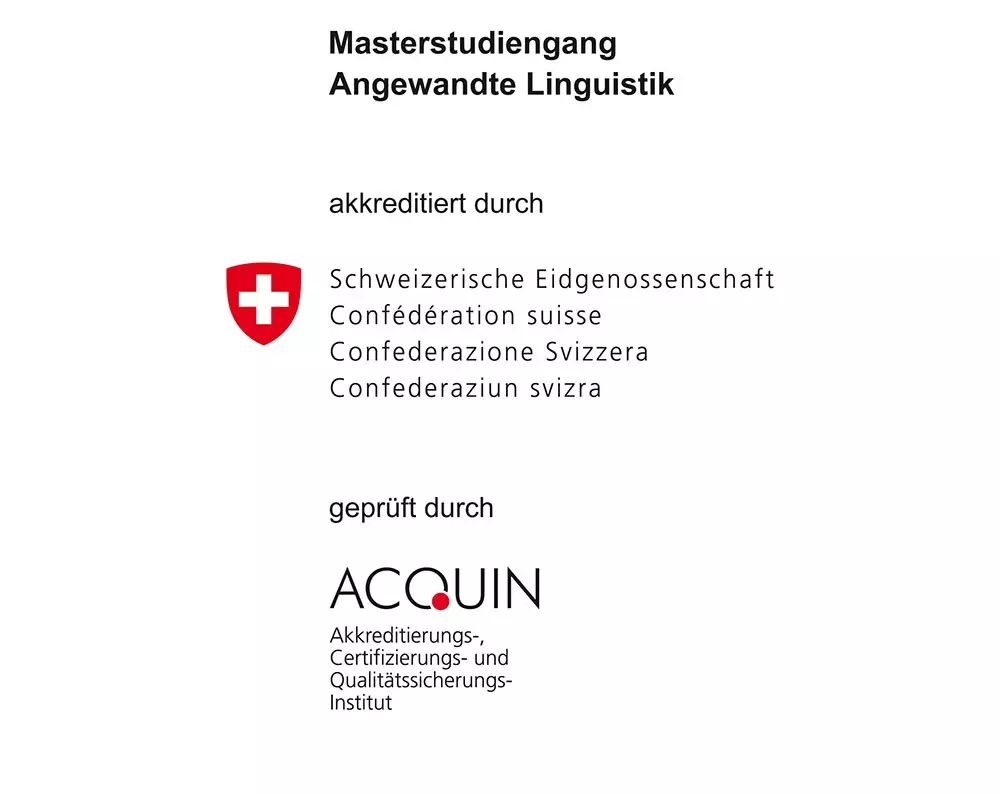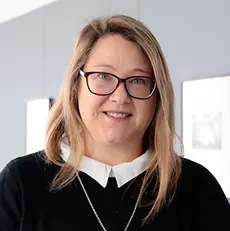Specialisation in Conference Interpreting
Working as a conference interpreter, you will ensure multilingual oral communication in a national and international context. In the specialisation in Conference Interpreting, you develop the skills you need to successfully launch your career.
During the MA programme, you learn the techniques and strategies of simultaneous and consecutive interpreting. Supported by professional conference interpreters, you work intensively on perfecting your professional competencies.
This enables you to put together a skill set that positions you perfectly to take on jobs both now and in the future. Thanks to these skills, you are able to assess digital tools, put them to appropriate use and supplement them in a targeted manner in cases in which human intelligence is superior to artificial intelligence.
But this isn’t all – your practical toolbox also includes rhetorical skills and expertise in the areas of voice training, speaking techniques and terminology management. Wide-ranging knowledge of the world and specialist know-how that you have been trained to expand yourself represent a further string to your bow. And at the heart of all this is your outstanding grasp of classic techniques of simultaneous and consecutive interpreting.
You hone the tools that form your repertoire as a conference interpreter in practice assignments at conferences, during numerous work assignments at non-profit organisations and as part of virtual practice sessions with experts from the European Union.
Applying your language skills in such practical settings that you can reflect upon allows you to develop your individual profile for your future career. You establish your individual profile for starting your career with your Master’s thesis, in which you deliberate an aspect relevant to the world of professional practice in such a way that a new solution that you have carved out yourself becomes tangible.
Career opportunities
Conference interpreters work as freelancers or are employed as in-house interpreters. Freelancers are recruited by specialist agencies, through the recommendation of colleagues or by clients directly. They work for trade unions, associations, political parties, etc. in a variety of venues, such as international congresses and conferences or internal events. Working hours and contracts can fluctuate widely due to the economic situation, seasonal demand and the short-term nature of the interpreting business. Institutions and international organisations may employ in-house conference interpreters with more regular working times and duty periods.
The MA specialisation in Conference Interpreting provides practical training in the relevant specialist, technical and professional competences. Graduates are therefore able to immediately embark on their career as conference interpreters.
Key information
The research-based core modules form part of the MA for all specialisations. In the core modules, you learn to reflect critically and constructively on professional practice. The modules investigate principles and methods of applied linguistics. In plenary lectures and in small groups of students from the different specialisations, you consider central issues relating to applied linguistics in professional practice and learn how to assess communication output in a proficient manner.
You can find all information specific to the specialisation in Conference Interpreting on this website. All important information about the core modules and other specialisations within the MA programme can be found on the MA in Applied Linguistics page.
The specialisation in Conference Interpreting features an international team of experienced lecturers. They are all practising conference interpreters and/or recognised experts in related disciplines or subject-specific areas (e.g. voice and speech training, economics). Thanks to their extensive experience in a wide variety of fields, they are able to give our students a direct insight into the profession and offer an ideal preparation for a career as a conference interpreter.
In the programme, you study at least three languages: your native or primary language (A language) and at least two foreign languages, which are classified as either “active” (B) or “passive” (C) languages. A candidate’s B language refers to an active foreign language into and out of which the candidate interprets. C languages are passive foreign languages out of which the candidate interprets. Your language combination must be at least ABC or ACCC. The results you achieve in the professional aptitude test will determine which of your languages is classified as A, B or C. One of the languages you pursue must be German.
The table below gives you an overview of the languages and language combinations we currently cover in the specialisation in Conference Interpreting. If there is sufficient demand, additional languages may be added. The MA programme director reserves the right to cancel a language version if there are not enough students enrolled.
| A language | B or C languages |
|---|---|
| German | French, Italian, English, Spanish |
| French | German, Italian, English, Spanish |
| Italian | German, French, English, Spanish |
| English | German, French, Italian, Spanish |
| Spanish | German, French, Italian, English |
Part-time study
You can choose to complete the MA in Applied Linguistics on either a full-time or part-time basis. The full-time programme is designed to be completed over three semesters. A part-time programme lasts between four and six semesters and can be applied for in writing via the academic office both prior to the commencement of the study programme and during your studies (subject to certain conditions).
Admission
Successful candidates have:
- strong written and oral communication skills in diverse contexts, a quick understanding and good powers of concentration; they are creative in their approach to problem-solving, intellectually curious and able to deal with criticism and to cope with pressure;
- a good general education and a thorough knowledge of economic, social, political and cultural conditions in the cultural areas of their chosen languages;
- an outstanding command of their native language and at least two foreign languages.
Before you begin your studies, we recommend you spend some time abroad to improve your language skills and enhance your cultural knowledge.
You must fulfil the following formal conditions in order to be admitted to the programme:
- Bachelor’s degree
You need to have a recognised Bachelor’s degree or an equivalent tertiary level qualification. - Professional aptitude test
The oral professional aptitude test for the specialisation in Conference Interpreting is designed to assess your practical skills in sight translation and consecutive interpreting. You must pass the test with a language combination of at least ABC or ACCC. We will provide you with sample texts when you apply to take the test.
We recommend that you prepare for the aptitude test by attending our one-semester online conference interpreting bridging course (in German), which takes place every autumn semester. In this bridging course, you learn interpreting techniques and skills such as note-taking, sight translation and consecutive interpreting as well as background knowledge relevant to the profession and standard German.
Information sheet on the professional aptitude test (in German) - Language competence (English/German)
To be admitted to the programme, you must have English language competence of at least C1 level and, in the case of non-native speakers of German, German language competence of at least C2 level. You will have to provide evidence in the form of language certificates, study records, job references, etc. If you are unable to provide evidence of this kind, you will be required to take a written language test at the ZHAW.
Please note that individuals who have been excluded from a Master’s degree programme at other universities that covers equivalent content can no longer be admitted to the corresponding specialisation at the ZHAW.
Dates and deadlines
The application deadline for the MA in Applied Linguistics with a specialisation in Conference Interpreting is 15 May. Applying in good time will allow you to optimally plan and prepare for your studies. On request, applications submitted at a later date may be considered. Please contact the degree programme office in this regard directly by sending an e-mail to master.linguistik@zhaw.ch.
| Programme start: Spring semester 2025 | |
|---|---|
| Submission of applications | 15 May 2024 |
| Language test | 9 September 2024 |
| Language test (resit date) | 2 November 2024 |
| Professional aptitude test | 6 – 17 January 2025 |
Accreditation

The MA in Applied Linguistics specialisation in Conference Interpreting received unconditional accreditation from the Federal Office for Professional Education and Technology (precursor of SERI) in 2012.


